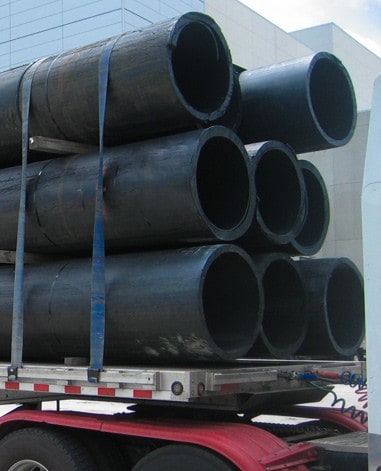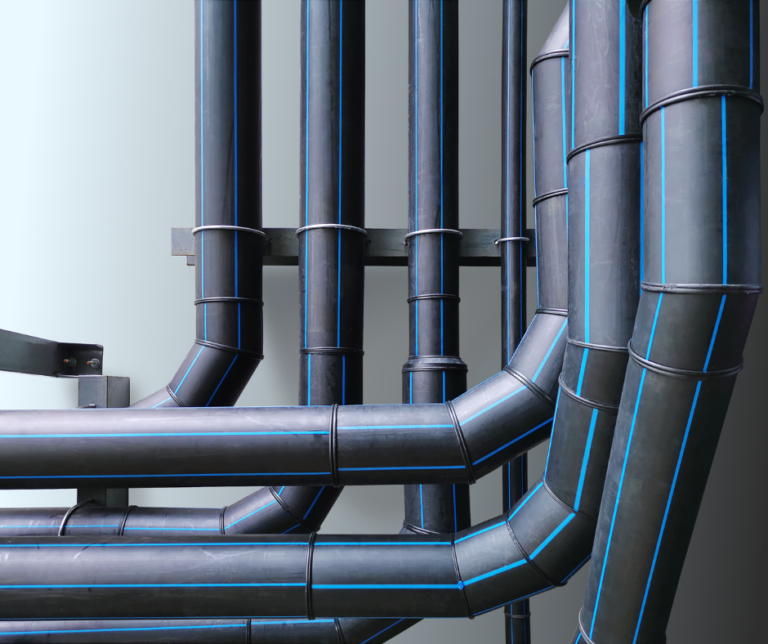American Plastics HDPE Pipe for Oilfield: Built for Harsh Conditions
Wiki Article
A Comprehensive Overview to the Numerous Uses of HDPE Pipe in Building and Sector
HDPE pipelines have become a critical part in modern construction and commercial applications. Their distinct residential properties, such as resistance to rust and lightweight layout, make them suitable for a large range of usages. From supply of water systems to agricultural irrigation, HDPE pipelines offer remedies that boost efficiency and sustainability. Comprehending their diverse applications is vital for professionals looking to enhance facilities. What certain benefits do these pipes give each sector?Supply Of Water and Distribution Systems
Water system and distribution systems are crucial components of city framework, commonly relying on high-density polyethylene (HDPE) pipes for their toughness and efficiency. These systems transportation potable water from therapy centers to consumers, guaranteeing ease of access and safety. HDPE pipes are preferred for their resistance to deterioration, chemicals, and extreme temperatures, which boosts their long life and minimizes maintenance costs. In addition, their lightweight nature enables simpler installation and transportation, making them excellent for various urban and rural applications.The versatility of HDPE pipelines enables them to be set up in tight rooms and around challenges, minimizing the demand for extensive excavation (American Plastics HDPE Pipe Manufacturing). Their smooth indoor surface area minimizes rubbing losses, improving water circulation rates. As cities remain to grow, the need for trusted water supply systems boosts, positioning HDPE pipelines as a lasting remedy for contemporary facilities jobs. Their tried and tested track document makes them a favored option among designers and urban organizers alike
Wastewater Administration and Therapy
Efficient wastewater administration and treatment are essential for preserving public wellness and environmental quality. HDPE pipes play an essential role in this procedure because of their longevity, resistance to deterioration, and ability to endure severe chemicals. These pipes are generally used in different applications, including sewer system, stormwater drain, and wastewater treatment facilities. Their lightweight nature assists in less complicated installation and transport, minimizing labor costs and time.Additionally, HDPE pipes have a smooth indoor surface area that lessens friction loss, advertising efficient circulation prices. They are likewise less prone to leaks and failings compared to conventional products, making sure that impurities are consisted of successfully. Moreover, their adaptability enables versatility in different soil conditions, making them suitable for varied environmental setups. As sectors progressively prioritize sustainable techniques, making use of HDPE pipes in wastewater monitoring systems lines up with objectives for decreasing ecological influence and enhancing source recuperation.
Agricultural Irrigation Solutions
In agricultural settings, effective irrigation options are essential for enhancing crop returns and managing water resources. HDPE (High-Density Polyethylene) pipes play a vital function in modern irrigation systems due to their toughness, versatility, and resistance to rust. Their capability to hold up against high pressures makes them optimal for both surface area and subsurface watering applications, ensuring uniform water distribution throughout areas.Farmers can make use of HDPE pipes in drip irrigation systems, which supply water directly to plant roots, lessening waste and promoting healthy development. Additionally, these pipes are light-weight and easy to install, reducing labor expenses and setup time. Their lengthy life-span and low upkeep requirements further boost their allure in farming methods.
Additionally, HDPE pipelines are environmentally friendly, as they can be recycled and do not seep damaging chemicals right into the dirt. This makes them a sustainable choice for farmers aiming to take on environment-friendly farming techniques while maximizing efficiency.
Industrial Applications and Processes
Flexibility is a trademark of HDPE pipelines, making them crucial in numerous industrial applications and procedures. These pipelines are widely made use of in chemical processing sectors because of their excellent resistance to a variety of corrosive materials. HDPE's light-weight nature, integrated with high tensile toughness, enables simple installation and lasting performance in demanding click for source settings.In the oil and gas industry, HDPE pipelines play a necessary role in moving hydrocarbons and gases, many thanks to their toughness and versatility - custom hdpe pipe manufacturing Midland TX. Furthermore, they are employed in mining procedures for the transportation of slurry and various other materials, where standard piping systems may fail
HDPE pipelines are increasingly utilized in manufacturing facilities for water supply lines and wastewater management. Their ability to stand up to severe temperatures and pressures makes them suitable for a variety of commercial processes. On the whole, HDPE pipes add greatly to performance and security across varied commercial applications.
Stormwater Management and Water Drainage Solutions
Stormwater monitoring and drain systems are essential components in urban framework, made to take care of excess rainfall and reduce flooding risks. High-density polyethylene (HDPE) pipes are progressively utilized in these systems because of their sturdiness, flexibility, and resistance to deterioration. These pipes efficiently deliver stormwater away from booming locations, lessening surface area drainage and stopping waterlogging.HDPE's light-weight nature assists in much easier installation, minimizing labor expenses and construction time. Additionally, its resistance to chemicals and ecological stressors guarantees long life and integrity in various environments. In enhancement to conventional drain applications, HDPE pipes are likewise utilized in innovative remedies such as eco-friendly facilities, that includes rainfall yards and absorptive sidewalks.

Often Asked Concerns
Exactly How Does HDPE Pipeline Contrast to PVC Pipeline in Cost?
As a whole, HDPE pipe has a tendency to be a lot more expensive than PVC pipe because of its improved sturdiness and versatility. Nevertheless, long-lasting expense factors to consider, such as maintenance and life expectancy, might favor HDPE in certain applications.
What Is the Lifespan of HDPE Pipeline Under Numerous Problems?
HDPE pipes commonly have a life-span of 50 to 100 years, depending upon ecological conditions, setup techniques, and use. Elements his comment is here such as temperature, dirt kind, and exposure to chemicals can considerably influence their resilience.plumbing leak detection near me
Can HDPE Water Lines Be Recycled After Usage?
Yes, HDPE pipelines can be recycled after usage. The reusing procedure includes thawing down the product, enabling it to be repurposed into new items, thereby advertising sustainability and minimizing environmental effect related to plastic waste.Exist Any Kind Of Certain Setup Challenges With HDPE Pipelines?
Installment obstacles with HDPE pipes include appropriate jointing techniques, ensuring ample trench conditions, and taking care of thermal expansion. Furthermore, knowledgeable labor is called for to handle specific devices, which can complicate the installment process in various settings.
What Accreditations Should I Seek When Investing In HDPE Pipings?
When acquiring HDPE pipelines, one must look for qualifications such as ASTM, AASHTO, and ISO, which verify high quality and compliance with sector requirements, assuring toughness and efficiency in different applications. - American Plastics HDPE Pipe ManufacturingReport this wiki page